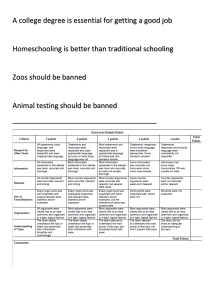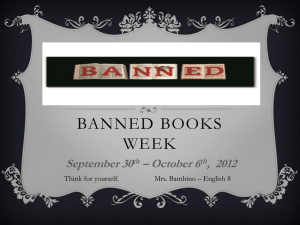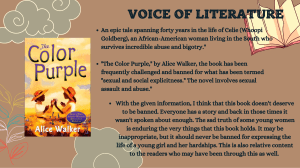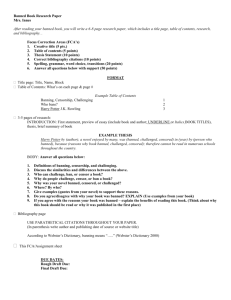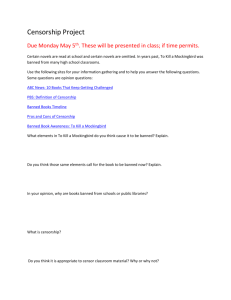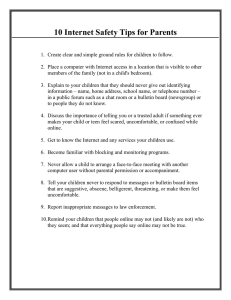Why We Should Not Ban Books: An Argument Against Censorship
advertisement
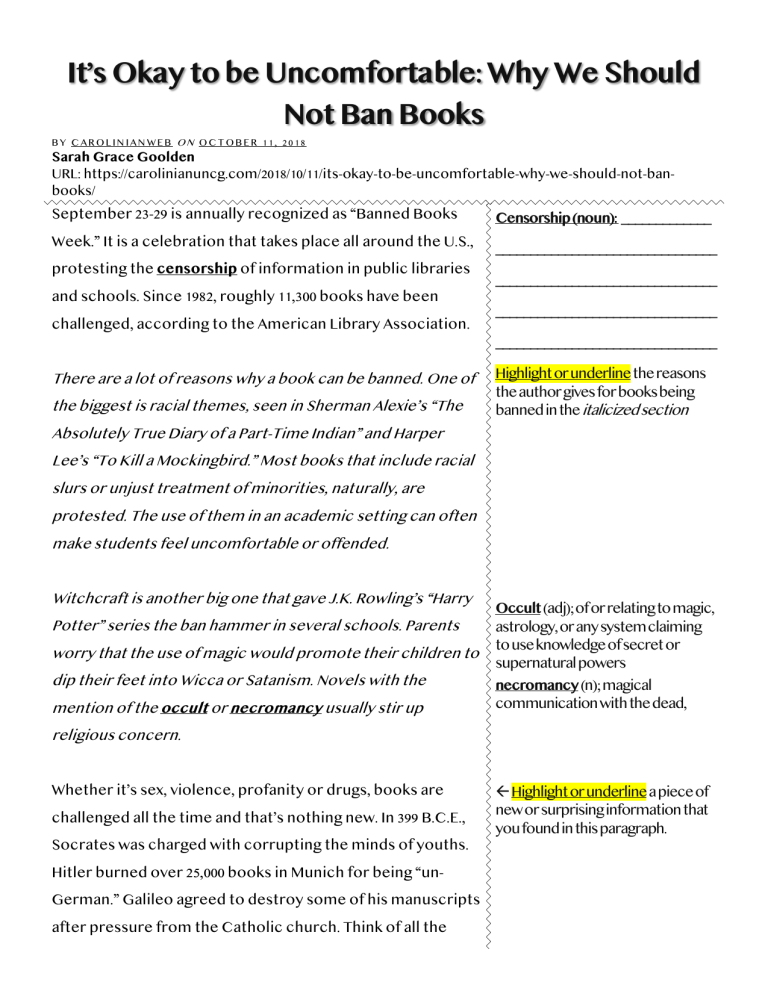
It’s Okay to be Uncomfortable: Why We Should Not Ban Books BY CAROLIN IAN WEB ON OCTOBER 11, 2018 Sarah Grace Goolden URL: https://carolinianuncg.com/2018/10/11/its-okay-to-be-uncomfortable-why-we-should-not-banbooks/ September 23-29 is annually recognized as “Banned Books Censorship (noun): _____________ Week.” It is a celebration that takes place all around the U.S., ________________________________ protesting the censorship of information in public libraries and schools. Since 1982, roughly 11,300 books have been challenged, according to the American Library Association. ________________________________ ________________________________ ________________________________ There are a lot of reasons why a book can be banned. One of the biggest is racial themes, seen in Sherman Alexie’s “The Highlight or underline the reasons the author gives for books being banned in the italicized section Absolutely True Diary of a Part-Time Indian” and Harper Lee’s “To Kill a Mockingbird.” Most books that include racial slurs or unjust treatment of minorities, naturally, are protested. The use of them in an academic setting can often make students feel uncomfortable or offended. Witchcraft is another big one that gave J.K. Rowling’s “Harry Potter” series the ban hammer in several schools. Parents worry that the use of magic would promote their children to dip their feet into Wicca or Satanism. Novels with the mention of the occult or necromancy usually stir up Occult (adj); of or relating to magic, astrology, or any system claiming to use knowledge of secret or supernatural powers necromancy (n); magical communication with the dead, religious concern. Whether it’s sex, violence, profanity or drugs, books are challenged all the time and that’s nothing new. In 399 B.C.E., Socrates was charged with corrupting the minds of youths. Hitler burned over 25,000 books in Munich for being “unGerman.” Galileo agreed to destroy some of his manuscripts after pressure from the Catholic church. Think of all the ß Highlight or underline a piece of new or surprising information that you found in this paragraph. texts which were lost with the destruction of the Library of Alexandria. I think it’s important to remember that when a novel is banned now, it is removed from the classroom; it is not removed from the public. Therefore, the onus lies on parents, rather than the average Joe with no kids. Onus: ________________________________ ________________________________ ________________________________ I understand the difficulty in deciding what is and what is not appropriate for children. After all, no one should ever be advocating for ‘Lolita’ to be taught to kindergarteners. ‘And Tango Makes Three’ by Peter Parnell and Justin Richardson is another story, literally. This book is specifically aimed towards a younger audience. It discusses same-sex relationships by illustrating the true story of two male penguins who fell in love and adopted their daughter, Tango, at New York’s Central Park. If that’s not the cutest sentence you’ve ever read, I don’t know what to tell you. line of this whole process: books can be very influential and What is the main point the journalist is making in this paragraph? ________________________________ that’s scary. It makes parents only want their own opinions ________________________________ taught, but that’s not how the world works. At some point or ________________________________ There is concern that Roy, Silo and Tango are leading the gay agenda, and that scares a lot of people. That’s the bottom another, little Suzy and little Johnny need to learn about racism and sex and gay people. That doesn’t mean that they’re going to experiment with it or even agree with these topics as they are presented. ________________________________ ________________________________ ________________________________ ________________________________ ________________________________ Some of this stuff is hard to read and I don’t mean ‘The What does the journalist mean by Canterbury Tales’ kind of hard to read. I’m talking about the “hard to swallow”? horrors of ‘Kite Runner’ and ‘Thirteen Reasons Why.’ The real ________________________________ problems human beings face are hard to swallow. Why should high schoolers be reading about them then? It’s important to be aware of all the bad stuff in the world because it’s going to be there when they graduate. Future adults don’t just have a right to this knowledge, their parents and educators have the obligation to prepare them. ________________________________ ________________________________ ________________________________ ________________________________ ________________________________ Banning books is just putting a bandaid on real problems. Is it uncomfortable how many times the N-word is used in ‘The Adventures of Huckleberry Finn?’ Yes, and by the way it’s 219 times in 366 pages. But it’s real life. People really spoke like that. It’s horrifying and students need to be aware how horrifying it was. Students need to remember the Holocaust and understand the treatment of minorities in both the past and present. Students need information. Who are we to deny them that? Sometimes being uncomfortable is a good thing. It means that we are recognizing an issue. To keep our heads down and be silent during injustice is unacceptable with the Vulgar (adj)________________________________ ________________________________ resources we have today. It is also unfair to forget the ________________________________ suffering of people of the past, because the subject seems ________________________________ vulgar. The world can be a cruel, unforgiving place, but banning books is not the answer. AFTER READING 1. What is the author’s overall message? List 2-3 pieces of evidence they use to support their message. ________________________________________________________________________________ ________________________________________________________________________________ ________________________________________________________________________________ ________________________________________________________________________________ ________________________________________________________________________________ ________________________________________________________________________________ ________________________________________________________________________________ ________________________________________________________________________________ 2. Do you agree or disagree with the author’s message? Explain your opinion. ________________________________________________________________________________ ________________________________________________________________________________ ________________________________________________________________________________ ________________________________________________________________________________ ________________________________________________________________________________ 3. Was taking notes in the margins helpful as you read this informational text? What other strategies can you use to read a text closely to ensure that you understand the information presented in a text? ________________________________________________________________________________ ________________________________________________________________________________ ________________________________________________________________________________ ________________________________________________________________________________ ________________________________________________________________________________ ________________________________________________________________________________ ________________________________________________________________________________ ________________________________________________________________________________ ________________________________________________________________________________ ________________________________________________________________________________ ________________________________________________________________________________
